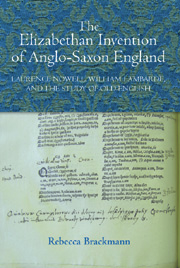 The Elizabethan Invention of Anglo-Saxon England
The Elizabethan Invention of Anglo-Saxon England Book contents
- Frontmatter
- Contents
- List of Illustrations
- Dedication
- Acknowledgements
- Chapter 1 The Anglo-Saxonists and Their Books: Print, Manuscript, and the Circulation of Scholarship
- PART I ANGLO-SAXON TEXTS AND SIXTEENTH-CENTURY ENGLISH
- Chapter 2 The Abcedarium Glossary: Sources and Methods of Nowell's Old English Lexicography
- Chapter 3 Inkhorns, Orthographers, and Antiquaries: Standardized English and the Dawn of Anglo-Saxon Studies
- PART II CHOROGRAPHIES AND THE PAST OF ENGLAND
- PART III OLD ENGLISH AND THE COMMON LAW
- Conclusion: The Invention of Anglo-Saxon England
- Bibliography
- Index
- Title in the Series
Chapter 2 - The Abcedarium Glossary: Sources and Methods of Nowell's Old English Lexicography
from PART I - ANGLO-SAXON TEXTS AND SIXTEENTH-CENTURY ENGLISH
Published online by Cambridge University Press: 05 February 2013
- Frontmatter
- Contents
- List of Illustrations
- Dedication
- Acknowledgements
- Chapter 1 The Anglo-Saxonists and Their Books: Print, Manuscript, and the Circulation of Scholarship
- PART I ANGLO-SAXON TEXTS AND SIXTEENTH-CENTURY ENGLISH
- Chapter 2 The Abcedarium Glossary: Sources and Methods of Nowell's Old English Lexicography
- Chapter 3 Inkhorns, Orthographers, and Antiquaries: Standardized English and the Dawn of Anglo-Saxon Studies
- PART II CHOROGRAPHIES AND THE PAST OF ENGLAND
- PART III OLD ENGLISH AND THE COMMON LAW
- Conclusion: The Invention of Anglo-Saxon England
- Bibliography
- Index
- Title in the Series
Summary
Undoubtedly, one of the greatest obstacles that early Anglo-Saxonists faced was the lack of dictionaries: their initial challenge, to begin sorting out Old English vocabulary in the manuscripts that interested them. The first person to do so with any real success, Laurence Nowell, became known as a preeminent (perhaps the preeminent) Tudor Anglo-Saxonist mainly because of his lexical work. Correspondingly, of the projects Nowell undertook in the Abcedarium, present-day Anglo-Saxonists have paid the most attention to the collection of lexical glosses written into the margin of the book's printed dictionary. James Rosier's article, the only previous study of Nowell's Abcedarium, focuses on these; Ronald Buckalew gives them some attention in his discussions of Nowell's transcript of Ælfric's Grammar and Glossary, and other analyses of Nowell have mentioned them. The Abcedarium notes have been mostly considered as a preliminary or adjunct to Nowell's best-known work of Old English lexicography, the Vocabularium Saxonicum, a manuscript dictionary of Old English–Early Modern English, now Oxford, Bodleian Library Selden supra 63. Albert Marckwardt edited the Vocabularium in 1952, making it easily accessible for modern scholars and facilitating the study of Nowell's work on Old English.
The Abcedarium glosses and the Vocabularium are certainly similar in their approach to Old English lexicography. Nowell alone among the early Anglo-Saxonists consistently placed Old English beside Early Modern English. His Vocabularium translates Old English into Early Modern English (with occasional Latin definitions as a supplement), unlike other lexicographers such as John Joscelyn, who translated mainly into Latin (with occasional English definitions as a supplement).
- Type
- Chapter
- Information
- The Elizabethan Invention of Anglo-Saxon EnglandLaurence Nowell, William Lambarde, and the Study of Old English, pp. 29 - 54Publisher: Boydell & BrewerPrint publication year: 2012


